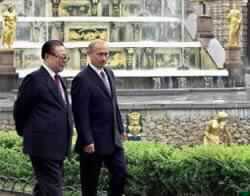HIGHLIGHTS: Uzbekistan Govt. Still Worried About Islamists in Afghanistan||Russia Re-assures Old Allies of Loyalty||China Worried Russia's Pro-Western Policy Could Bring NATO to its Borders|| STORY: Russia, China and four Central Asian states pledged on Friday to step up action against international terrorism as Uzbekistan voiced fears of fresh Islamic extremism in regional hotspot Afghanistan.
Leaders of the so-called Shanghai Six, which also includes the former Soviet states of Kazakhstan, Kyrgyzstan and Tajikistan, signed a charter to turn their organization into a fully-fledged international body.
At a summit in St. Petersburg, the countries of the Shanghai Cooperation Organization (SCO) agreed to set up a new anti-terrorist body based in Kyrgyzstan. It was not clear what the functions of this body would be.
Uzbek President Islam Karimov, whose country borders northern Afghanistan, said the potential dangers still lurking there should not be underestimated.
Referring to the decision to upgrade the SCO by creating a charter, Russian President Vladimir Putin said: "The development of events in the world support the fact that its creation was correct and justified."
Russia was swift to declare its support for the U.S.-led war on international terrorism in the wake of the September 11 hijack attacks on the United States, and several Central Asian states played host to U.S. troops during the strikes on Afghanistan.
RUSSIA LOOKS EAST AFTER LOVE-IN WITH WEST
Friday's meeting also provided an opportunity for Russia to reassure China and other traditional allies of its loyalty to old friends as well as new.
"Russia is ready to contribute wholeheartedly so that this organization can be an efficient instrument, and for it to play an independent, constructive and tangible role in international affairs," Putin said.
The top-level meeting in Russia's old imperial capital follows hot on the heels of a flurry of summits late last month, which saw Putin tie up major security agreements with the United States and NATO, as well as entertaining EU leaders in Moscow.
In particular, Beijing has watched warily as Russia and the U.S.-led military alliance have warmed to each other, concerned that in the long-term closer ties could bring NATO to China's borders.
Putin and Jiang held bilateral talks in St. Petersburg on Thursday, but no details were released. Putin has reassured Jiang that all arms deals with China will be honored. (Read photo caption)
Before the September 11 hijack attacks on the United States, Beijing and Moscow had been forging a new strategic relationship based mainly on their opposition to Washington's planned missile defense systems and their opposition to international meddling in other countries' affairs.
The two presidents signed a friendship treaty in July last year that was supposed to cement that partnership. But much changed after September 11.
PHOTO CAPTION
Chinese President Jiang Zemin (L) and Russian President Vladimir Putin walk in front of the Grand Cascade fountains at the former Russian imperial residence in Peterhof outside St. Petersburg, June 7, 2002. Russia will seek to reassure China at a summit in St. Petersburg that its rapprochement with the West does not undermine their own friendship. Photo by Pool/Reuters
- Author:
& News Agencies - Section:
WORLD HEADLINES


 Home
Home Discover Islam
Discover Islam Quran Recitations
Quran Recitations Lectures
Lectures
 Fatwa
Fatwa Articles
Articles Fiqh
Fiqh E-Books
E-Books Boys & Girls
Boys & Girls  Ramadan
Ramadan Fatwa Audios
Fatwa Audios Month of Mercy
Month of Mercy Women
Women Eed Al- Fitr
Eed Al- Fitr Food Recipes
Food Recipes Videos
Videos

 Prayer Times
Prayer Times












